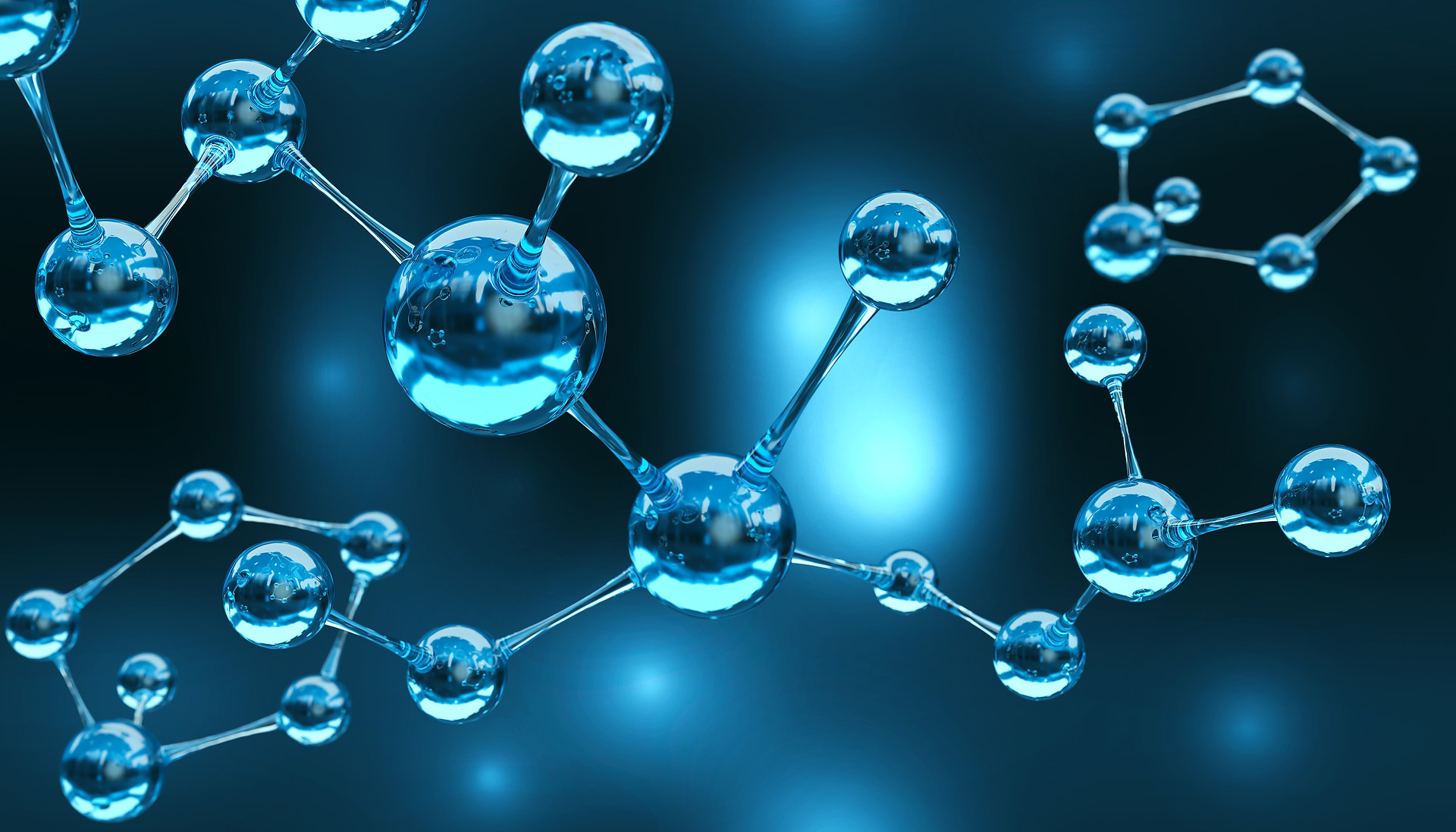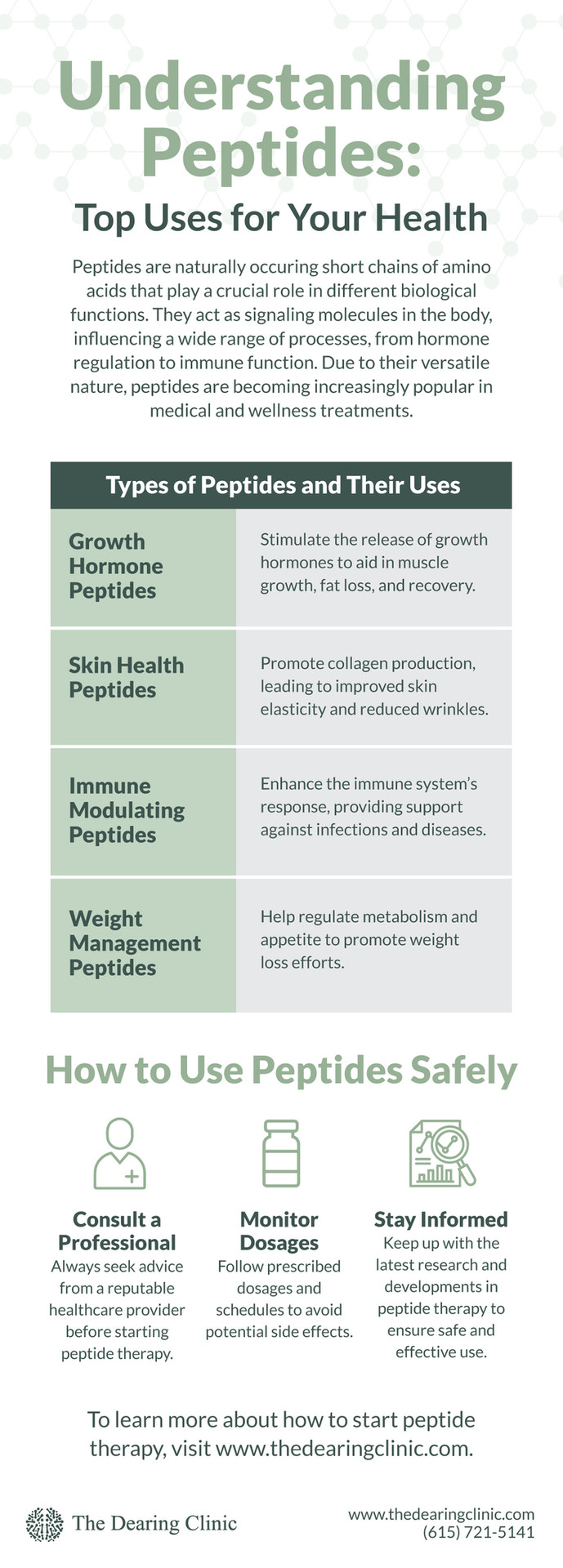What Are Peptides? Top Uses and Benefits for Your Health
Peptides are small chains of amino acids that join together in a particular sequence and play significant roles in different functions throughout your body, offering health benefits such as resolving fine lines and wrinkles, promoting weight loss, providing pain relief, supporting immune health, and more.


Peptides are small chains of amino acids that join together in a particular sequence and play significant roles in different functions throughout your body, offering health benefits such as resolving fine lines and wrinkles, promoting weight loss, providing pain relief, supporting immune health, and more.
What Are Peptides?
Peptides are short chains of amino acids (the building blocks of proteins) linked together in a particular sequence by peptide bonds. These bonds are formed through a process called peptide synthesis, in which the carboxyl group of one amino acid reacts with the amino group of another amino acid.
Peptides can vary in length, averaging around 40 amino acids, but they can increase to 50. Interestingly, the specific sequence of amino acids in a peptide determines its unique properties, functions, and health benefits.
Peptides can have a basic structure consisting of a single chain of amino acids, known as linear peptides, or they can have a more complex structure, such as cyclic peptides or branched peptides.
Peptide bonds are formed through a condensation reaction, in which water is released as a byproduct. This reaction occurs between the carboxyl group of one amino acid and the amino group of another amino acid, resulting in the formation of a peptide bond.
The ultimate purpose of a peptide is to act as a signaling molecule in order to regulate bodily processes such as your metabolism, immune response, and cell-to-cell communication.
Types of Peptides
Peptides vary in length, structure, and function, and they’re classified into different types of peptides based on these characteristics. Common types of peptides include:
- Natural peptides. These peptides are naturally produced in your body and are responsible for specific functions in the processes within your body.
- Synthetic peptides. These peptides are artificially created in a lab and can mimic the actions of natural peptides.
- Short peptides. These peptides consist of a smaller number of amino acids and often have regulatory functions, meaning they help to keep certain bodily functions stable.
- Long peptides. These peptides contain a larger number of amino acids and can have structural or signaling roles.
What Do Peptides Do in the Body?
Now that you know more about the types of peptides that exist, let’s take a closer look at what peptides do in your body.
Peptides play an important role in many different processes in your body. They can act as neurotransmitters, hormones, enzyme regulators, and immune modulators, as well as complete other functions.
Some of the key roles of peptides in your body include:
- Cell signaling. Peptides can act as signaling molecules to communicate information between your cells and regulate different cellular processes in your body.
- Regulation of gene expression. Peptides can influence the expression of your genes, controlling the production of specific proteins and influencing cellular functions.
- Immune response modulation. Certain peptides can influence your immune response, meaning they play a role in defending your body against infections and diseases.
- Neurotransmission. Peptides act as chemical messengers in your brain and nervous system by transmitting signals between your neurons (the nerve cells that send messages throughout your body to facilitate everything from breathing and eating to walking and talking).
Additionally, here are some of the specific peptides found within your body and what each is responsible for.
- Insulin: The first peptide ever discovered, insulin regulates your blood sugar levels by promoting the uptake of glucose into your cells.
- Growth hormone: Stimulates growth, cell regeneration, and repair within your body.
- Oxytocin: Known as the “love” hormone, it assists with social bonding, childbirth, and even lactation.
- Glucagon: Increases your blood sugar levels by promoting the breakdown of glycogen into glucose.
Because stress, inflammation, and chronic health conditions are known to diminish your peptides, some opt to pursue peptide therapy. Keep reading for more information on this therapeutic practice.
What Are Peptides Used For? 4 Benefits
As you can see, because peptides act as signaling molecules, they’re able to support many different functions within your body. And due to their diverse functions, peptides have attracted significant attention in the fields of medicine and biotechnology.
In fact, researchers are exploring the potential of using peptides in developing novel treatments for many different conditions, including diabetes, obesity, autoimmune disorders, and even certain types of cancer.
Here’s why: By targeting certain receptors or enzymes in your body, peptides can influence specific biological pathways with precision, offering a more tailored and targeted therapeutic approach. This is a practice known as peptide therapy.
A few of the common uses and benefits of peptide therapy include:
1. Promoting weight loss and fat loss
There’s a lot of buzz around using peptides for weight loss as well as fat loss. Here’s why: Certain peptides, such as GLP-1 (glucagon-like protein 1), have been studied for their potential role in promoting weight loss and reducing fat accumulation. Here’s why: They can stimulate your metabolism, increase your ability to burn fat, and suppress your appetite, making them valuable tools in managing your weight and promoting a healthy body composition.
Researchers found that using GLP-1 for weight loss resulted in participants losing an average of 14.9 percent of total body weight!
These peptides work by targeting the receptors in your brain that regulate hunger and satiety, helping you to maintain a balanced and controlled approach with your eating habits.
2. Boosting muscle growth
Certain growth hormone peptides have been used to stimulate muscle growth and enhance athletic performance. Specifically, it’s been found to increase both your exercise tolerance and maximum oxygen uptake.
Additionally, by promoting the synthesis of new muscle tissue and aiding in the repair of damaged muscles, these peptides can help athletes and fitness enthusiasts achieve their performance goals.
3. Enhancing cognitive function
Certain peptides, such as nootropics, have been found to improve memory, focus, and cognitive performance. Interestingly, study findings revealed that these effects were especially beneficial in cases where these functions were impaired.
By targeting specific neurotransmitters in your brain, these peptides enhance neural communication and support optimal brain function. As a result, this makes them attractive options for people looking to support their mental acuity, whether it be for academic pursuits or professional success.
4. Improving skin health
Peptides such as collagen peptides are used to promote skin elasticity, reduce wrinkles, and improve overall skin health. In fact, research has shown that injectable collagen is highly beneficial for furrows, superficial scars, and superficial atrophy (skin thinning).
Additionally, you may have noticed an increase in companies incorporating peptides into skincare products. This is because collagen peptides work by signaling your skin cells to produce more collagen, which is essential for maintaining the skin’s structure and firmness.
While this list is by no means exhaustive, this gives you an idea of the power of peptides and how they’re used to promote overall health and well-being. Ultimately, peptide therapy aims to replenish lost and/or diminished peptides and potentially slow down the aging process, leading to improved vitality and overall quality of life.
By restoring your body’s natural peptide levels, you can experience increased energy, improved cognitive function, and even a more youthful appearance!

FAQs About Peptides
Still have some lingering questions about peptides? Check out these questions and answers.
1. Are peptides like steroids?
Peptides and steroids are two different types of compounds with distinct structures and functions. And while both peptides and steroids have effects on the body, they differ in several ways.
But one major difference is that unlike steroids, which are known for their potential to cause hormonal imbalances and unwanted side effects, peptides are generally considered to be safer and more targeted in their actions.
2. What foods are high in peptides?
You may be surprised to learn that peptides naturally occur in the very foods you eat on a regular basis. If you’re looking to consume more foods high in peptides, you’ll want to begin with foods rich in protein. Here’s a list to get you started:
- Grass-fed meat and organic poultry
- Wild-caught fish and seafood
- Eggs
- Legumes, such as lentils and beans
- Nuts and seeds
By incorporating these protein-rich foods into your diet, you can naturally increase your intake of peptides.
3. Do peptides have side effects?
While peptides offer several benefits and are generally regarded as safe to use, it’s important to be aware of potential side effects and risks associated with their use.
First, it’s essential to understand that improper use or dosage of peptides can lead to adverse effects on health.
Some potential side effects of peptide use can include:
- Injection site reactions
- Allergic reactions
- Changes in hormone levels
- Interactions with medications or supplements
As a result, it’s important to consult with a healthcare professional before using peptides and to follow their guidance to minimize the risk of any side effects to ensure safe and effective use.
4. What conditions can peptide therapy treat?
Peptide therapy has the potential to address a wide range of health conditions, including weight management, muscle building, cognitive support, skin health, and anti-aging purposes.
Specifically, peptide therapy has shown promise in treating a variety of conditions, including:
- Growth hormone deficiencies
- Inflammatory disorders
- Age-related conditions
- Metabolic disorders
- Wound healing and tissue repair
- Neurological disorders
5. How does peptide therapy work?
If you’re interested in beginning peptide therapy, it’s important to understand that peptide therapy works by introducing specific peptides into your body to target certain biological processes.
These peptides interact with your body’s receptors, trigger specific cellular responses, or regulate your body’s production of hormones and other signaling molecules. The precise mechanisms of action differ depending on the peptide being used and the desired therapeutic outcome.
Here at The Dearing Clinic, we use practitioner-grade peptides for maximum benefit. If you’re located outside the Nashville area, make sure to ask your healthcare provider for a reputable clinic that offers practitioner-grade peptides to ensure you’re getting the most benefits from your peptide therapy sessions.
Ready to feel like you again?
* Your next step toward feeling better starts today. At The Dearing Clinic we make it simple to get started with care that truly fits your life. Book your visit now and let’s design a plan that restores your energy, relieves your pain, and helps you enjoy more of what matters most.


